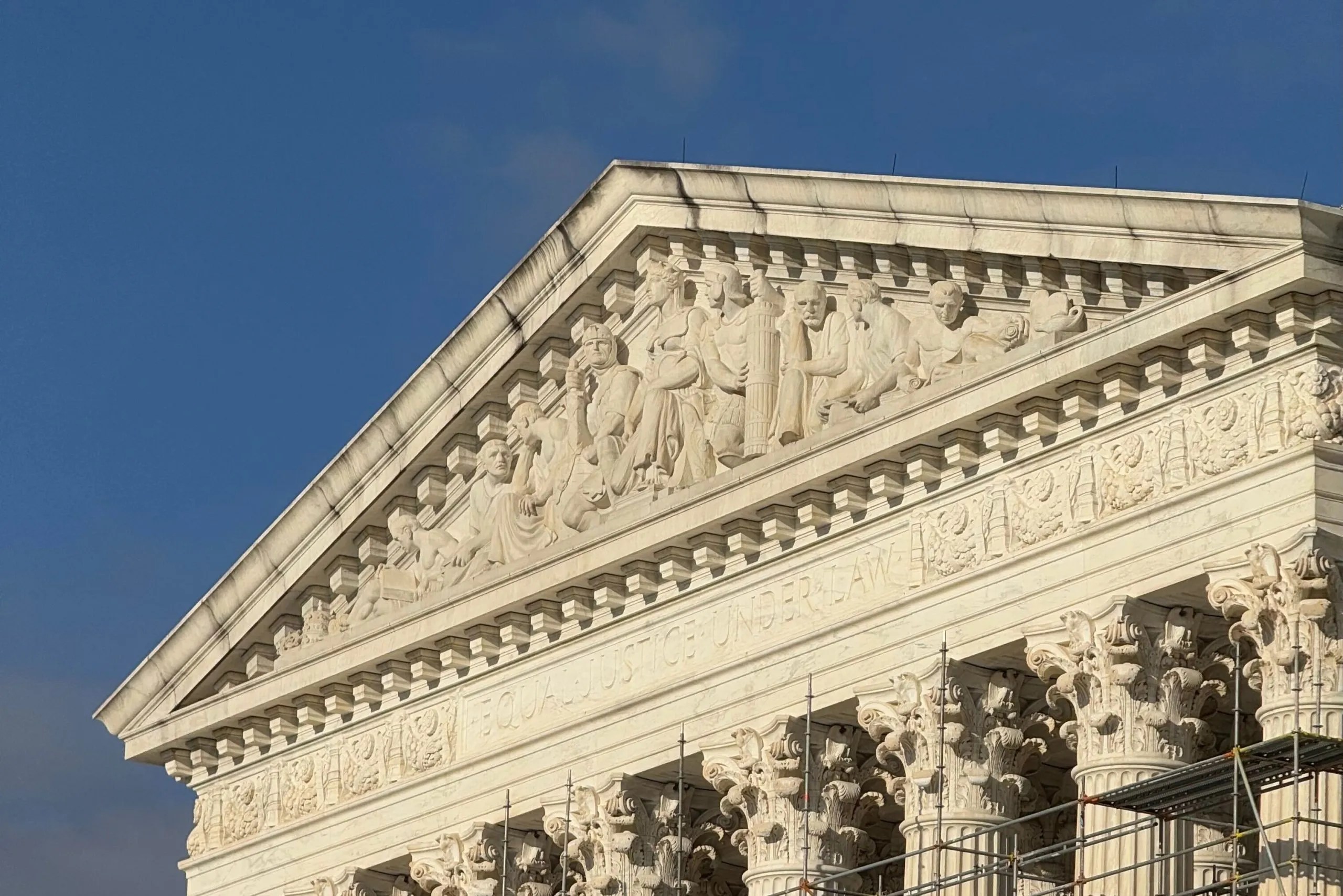SCOTUStoday for Friday, October 24


To prepare this newsletter, the SCOTUSblog team reads a lot of legal news. Here’s the most memorable headline we saw this week: Court: Chimps don’t have human rights, must stay in Michigan zoo.
Morning Reads
- Trump backs away from sending federal troops to San Francisco after pleas from tech leaders (Alexandra Marquez and David Ingram, NBC News) — President Donald Trump on Thursday said that “he is calling off plans to deploy federal troops to San Francisco after speaking to the city’s mayor and following backlash from the tech industry,” according to NBC News. His decision keeps San Francisco clear, at least for now, of ongoing legal battles over Trump’s authority to federalize and deploy the National Guard to cities that oppose the deployment. “The Trump administration and California’s government are already engaged in a legal battle over the president’s deployment of National Guard troops to Los Angeles earlier this year to quell protests against immigration enforcement raids in the city and surrounding areas. … Trump has also deployed the National Guard to Portland, Chicago and Washington this year,” and the question of whether the Chicago deployment can proceed is in front of the Supreme Court.
- Cities, nonprofits challenge Trump grant freeze at Fourth Circuit (Steve Garrison, Courthouse News Service) — Two months after the Supreme Court held in National Institutes of Health v. American Public Health Association that disputes over the Trump administration’s effort to freeze certain federal grants likely belong in the Court of Federal Claims, the U.S. Court of Appeals for the 4th Circuit is weighing whether it was improper for a U.S. district judge in South Carolina to order the administration to fund “more than 30 environmental or agricultural grants awarded to various nonprofits and cities,” according to Courthouse News Service. The government contends, citing the NIH decision, that the case on the environmental and agricultural grants needs to move to the Court of Federal Claims, while the grantees “argued Thursday that the constitutional claims raised in the suit could not be properly decided by the 16-judge court that specializes in handling government contract disputes.”
- ‘That would be neat’: American businesses eye $1 trillion in tariff refunds—and a long fight ahead—depending on the Supreme Court (Sasha Rogelberg, Fortune)(Paywall) — If the Supreme Court upholds lower court rulings striking down tariffs, the federal government may need to refund up to $1 trillion in tariff revenue to American companies, according to U.S. Treasury Secretary Scott Bessent. However, finance experts told Fortune that some small businesses may forego the money in order to avoid what could turn out to be a complicated refund process. “The general feeling is, if you have the resources, and you have the capability, the juice is worth the squeeze,” said David Warrick, executive vice president of supply-chain risk management firm Overhaul. “If you are a smaller business or a smaller importer, you’ve already spent time baking in the cost of tariffs and the associated risks to your supply chain, then you’ve got to weigh up that cost-benefit.”
- Harvard sees drop in Black, Hispanic student admissions, rise in Asian Americans (Lexi Lonas Cochran, The Hill) — Harvard College’s latest admissions data shows that Black students comprise 11.5% of the school’s class of 2029, down from 14% in the class of 2028, according to The Hill. “For Black students, the slide has been consistent since the 2023 Supreme Court decision that outlawed affirmative action in higher education. Before the decision, Black students made up 18 percent of Harvard’s student population.” Hispanic student admissions are also down (from 16% to 11%), but the share of Asian American students is up by four percentage points. Harvard did not provide admissions data for white students.
- Fighting Trump and defending Tesla, lawyer Paul Clement is everywhere now (Mike Scarcella, Sara Merken, and David Thomas, Reuters) — Former U.S. Solicitor General Paul Clement has argued more than 100 cases before the Supreme Court, and he’s showing no signs of slowing down, according to Reuters. He’s set to argue two cases in front of the court in December, and he’s working on several other high-profile disputes. “He’s on the team representing Federal Reserve Governor Lisa Cook in a major fight at the Supreme Court over Trump’s effort to oust her, and defending U.S. judges in Maryland in an unusual lawsuit brought against them by the U.S. Justice Department over immigration. … For [Elon] Musk, Clement is part of a team defending Tesla in federal court in wrongful death litigation, and representing X Corp in a battle with watchdog Media Matters.”
SCOTUS Quick Hits
- SCOTUSblog is seeking an intern. Get the details here.
- Several cases on the interim docket are fully briefed and awaiting the court’s response, including the Trump administration’s request to be allowed to federalize and deploy the National Guard in Illinois. For more information on the current state of the interim docket, check out Kelsey’s story in the On Site section below.
- Justice Ketanji Brown Jackson is scheduled to speak at Springfield Symphony Hall in Springfield, Massachusetts, on Monday night, about her path to the Supreme Court.
A Closer Look: Capital Punishment
The Supreme Court on Thursday denied two requests for a stay of execution from Anthony Boyd, clearing the way for him to be put to death in Alabama hours later. Boyd became the 40th person executed in the United States this year, which has seen a surge of executions after a period of decline, as SCOTUSblog reported last month.
So far this year, the Supreme Court has considered more than 30 emergency stay applications for persons on death row, and it has not granted a single one. For those who are familiar with the court’s typical approach to capital litigation, this trend likely isn’t surprising. Such emergency applications are rarely viewed favorably by the justices.
Most of this year’s denials have come and gone without a noted dissent. Boyd’s case is one exception. Justice Sonia Sotomayor wrote a dissent from the denial, joined by Justices Elena Kagan and Ketanji Brown Jackson.
Another exception is the case of Crawford v. Mississippi, which the court addressed last week. Charles Ray Crawford contended that his attorneys “conceded [his] guilt before the jury” after he expressly told them not to, and noted that the Supreme Court later held in a separate case that such an action by attorneys violates the Sixth Amendment. Crawford’s stay request was denied, but, as with Boyd, Sotomayor dissented, joined by Kagan and Jackson.
Death row inmates have fared better when their case makes it to the merits docket, at least in recent years. During the 2024-25 term, the justices ruled in favor of the inmate in three cases – Andrew v. White, Glossip v. Oklahoma, and Gutierrez v. Saenz – by either asking a lower court to reconsider their claims or ordering a new trial. In the term ahead, the court will again weigh in on the administration of the death penalty in Hamm v. Smith, a case about how courts, when presented with multiple IQ scores, should determine whether a capital defendant is so intellectually disabled that he may not be executed.
SCOTUS Quote
“From this day forward, I no longer shall tinker with the machinery of death.”
— Justice Harry Blackmun in Callins v. Collins
On Site
From Kelsey Dallas
The Interim Docket Remains Active
The Supreme Court is done hearing argument for October, but that does not mean it’s done making major rulings. There are several applications awaiting action on the court’s interim docket, including the Trump administration’s request to be allowed to federalize and deploy the National Guard within Illinois and its attempt to change the current rules for sex markers on passports. Check out Kelsey’s story for a brief overview of the pending applications.
From Amy Howe
Court Turns Down Man’s Request to Die By Firing Squad
The Supreme Court on Thursday afternoon turned down a request from an Alabama inmate to block his execution. In an unsigned order, the justices denied Anthony Boyd’s plea to put his execution on hold and to decide whether executing him by nitrogen hypoxia would violate the Eighth Amendment’s ban on cruel and unusual punishment. Justice Sonia Sotomayor dissented from the court’s decision to allow the execution to go forward. In a nine-page opinion joined by Justices Elena Kagan and Ketanji Brown Jackson, Sotomayor wrote that “Boyd asks for the barest form of mercy: to die by firing squad, which would kill him in seconds, rather than by a torturous suffocation lasting up to four minutes. The Constitution would grant him that grace. My colleagues do not,” as Amy noted in her analysis.
Court to Consider Whether to Hear Challenge to Same-Sex Marriage
The court is scheduled to consider whether to hear Kim Davis’ challenge to same-sex marriage at the justices’ private conference on Friday, Nov. 7. As a general practice, the court does not grant review without considering a case at at least two consecutive conferences; this is the first conference in which Davis’ challenge will be considered. For more on Davis’ petition for review, read Amy’s analysis.
Posted in Featured, Newsletters